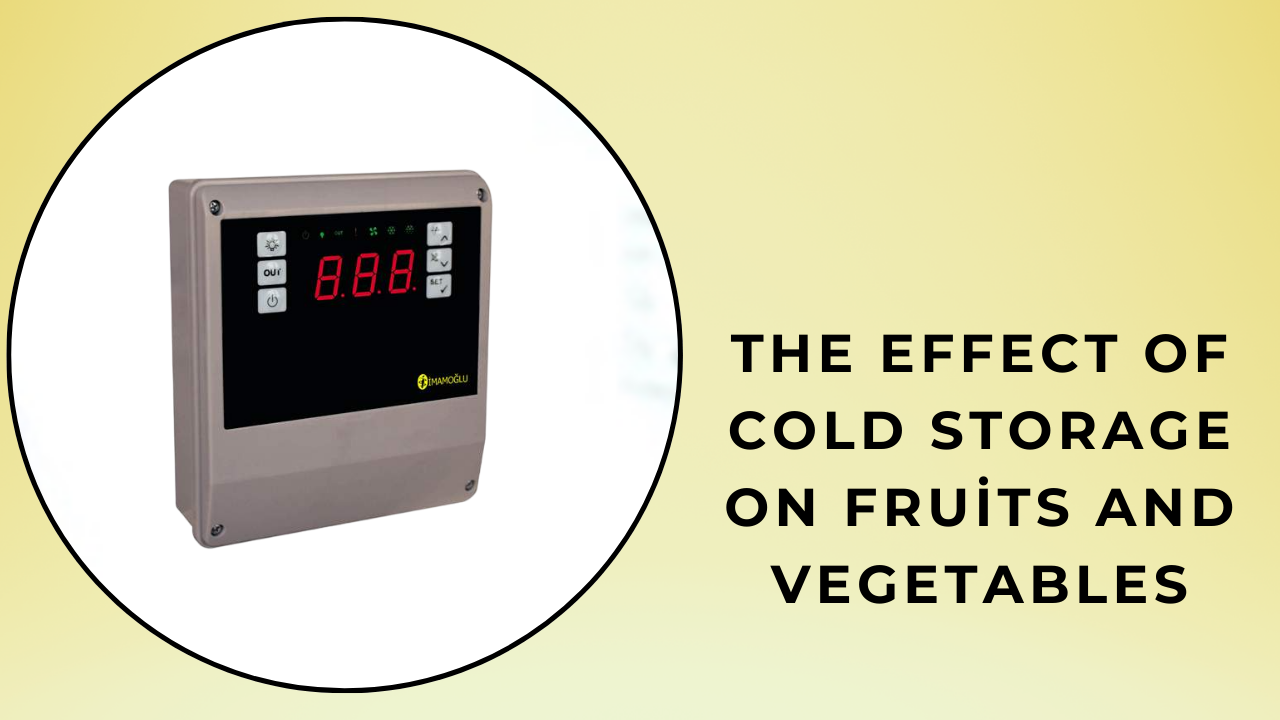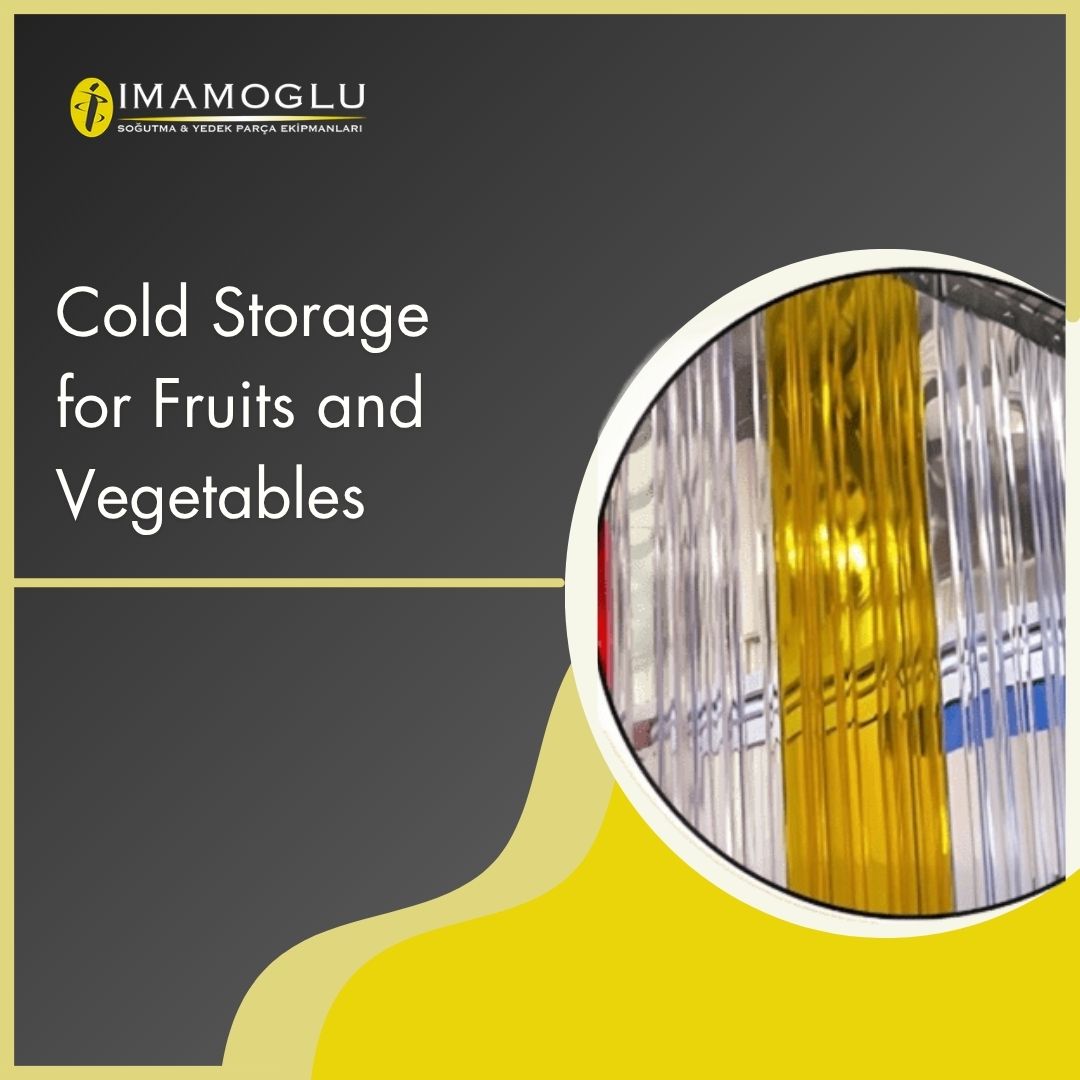Cold Storage for Fruits and Vegetables
Contents
-
What is Cold Storage for Fruits and Vegetables?
-
The Effect of Cold Storage on Fruits and Vegetables
-
Things to Consider When Choosing a Fruit and Vegetable Cold Storage
-
Design of Fruit and Vegetable Cold Storage
-
Storage Time of Fruits and Vegetables in Cold Storage
-
Maintenance and Efficiency of Cold Storages
-
Benefits of Cold Storage for Fruits and Vegetables
Cold Storage for Fruits and Vegetables
Fruits and vegetables react quickly to outdoor conditions due to their sensitive structure. Temperature changes, humidity and air flow directly affect how long these products stay fresh. For this reason, optimal environmental conditions should be provided for the storage of fruits and vegetables. Cold storages are the most effective solution to meet these needs. While these warehouses extend the life of the products, they also create the necessary environment for fresh food supply. Thanks to cold storage, the quality of fruits and vegetables is preserved and preserved for a long time without spoiling.
Ensuring the correct temperature and humidity balance is one of the most important functions of cold storages. These conditions not only extend the storage period of different fruits and vegetables, but also preserve the nutritional value of the products. For example, hard fruits such as apples and oranges can be stored at low temperatures for a long time, while delicate fruits such as strawberries require more careful conditions. These different conditions can be specifically adjusted according to the type of products. A good cold storage not only keeps products fresh, but also provides an economic advantage to businesses by ensuring energy efficiency.

The Effect of Cold Storage on Fruits and Vegetables
Cold storage plays a critical role in keeping fruits and vegetables fresh. These stores slow down the maturation processes, It extends the shelf life of fruits and vegetables. In particular, correct regulation of temperature and humidity delays spoilage processes. Fruits and vegetables stored in cold storage are preserved without being affected by external factors and without losing their nutritional value. This both provides fresh food to consumers and helps businesses minimize food loss.
The controlled atmosphere in cold storage also preserves the characteristics of fruits and vegetables such as color, flavor and texture. Food safety is also ensured in this environment because it is ensured that the products are stored in hygienic conditions. Fruits and vegetables can ripen and spoil quickly, especially during the hot summer months. Cold storages control this process and ensure that products are stored in the best condition. Cold storage minimizes vitamin loss in fruits and vegetables through the combination of high humidity and cold air.
Things to Consider When Choosing a Fruit and Vegetable Cold Storage
When choosing cold storage, the unique needs of each product should be taken into account. Each fruit and vegetable requires different temperature and humidity levels during storage. Therefore, cold storages must be flexibly adjustable. This type of warehouse can create effecting conditions for all types of products. The width of the storage area is also important because a larger space is required to store more products. In addition, the internal structure and design of the cold storage must be suitable for storing products effectively.
The energy efficiency of warehouses is also a factor that should not be ignored. Efficient energy use reduces the costs of businesses and ensures an environmentally friendly approach. Insulation materials used in cold storages also play an extremely important role. The quality of the insulation prevents the cold air inside the warehouse from escaping to the outside and contributes to the efficient operation of the cooling system. In this way, energy consumption decreases and operating costs decrease. In addition, regular maintenance of cold storages increases warehouse efficiency and provides great profits in the long term.
Design of Fruit and Vegetable Cold Storage
The design of cold storage is a critical factor in ensuring that products remain fresh for a long time. This design includes effective storage and ventilation of products, as well as efficient use of interior space. Ventilation ensures proper distribution of air within the warehouse, helping to keep all products at equal temperatures. However, the humidity must also be controlled accurately. Otherwise, rotting and spoilage may occur in fruits and vegetables. Cold storages should be designed to ensure that products remain fresh, along with an efficient ventilation system.
The shelving systems used in the warehouse also have an important place in the design. Products must be stored correctly and the shelves must have the appropriate height and durability for the products. Shelf systems need to be arranged to help keep products fresh. Additionally, the materials used in cold storage must be durable and hygienic. Easy-to-clean materials are important to ensure food safety. These design elements ensure that cold storages operate effectively and make it possible for products to remain fresh for a long time.
Storage Time of Fruits and Vegetables in Cold Storage
The storage time of fruits and vegetables in cold storage varies depending on storage conditions and type of product. Each fruit and vegetable has different storage times and can stay fresh for a long time when appropriate temperature and humidity levels are provided. For example, apples can be stored in cold storage for several months, while delicate fruits such as strawberries can spoil within a few days. Therefore, cold storages should be designed so that they can be customized according to the type of products.
Storage time also varies depending on the maturity of the product. While unripe fruits and vegetables can be stored longer, ripe produce has a short shelf life. Cold storages ensure that products are stored in customized conditions according to these variations. This helps businesses provide the right product at the right time. Storing fruits and vegetables in the right conditions allows preserving the nutritional value of the products and providing fresh food to customers.
Maintenance and Efficiency of Cold Storages
Maintaining cold storage is critical to maintaining its efficiency. Regular maintenance ensures that storage conditions are always optimum. In particular, the maintenance of cooling systems should not be neglected. Periodic checks of cooling systems optimize energy consumption and ensure long life of the system. It is also important to clean the internal structure of cold storages regularly. Cleanliness helps maintain hygiene and store products safely.
An efficient cold storage reduces operating costs by saving energy. Additionally, the quality of the insulation and the effectiveness of the cooling systems ensure that temperature levels inside the warehouse are kept constant. This helps maintain the quality of the products. In order for cold storages to operate efficiently, regular maintenance, monitoring of storage conditions and correct adjustment of systems are required. These factors increase the efficiency of businesses, extend the shelf life of products and prevent food loss.
Benefits of Cold Storage for Fruits and Vegetables
Fruit and vegetable cold storage offers many advantages for producers. First of all, it helps provide quality and safe food to consumers by ensuring that the products remain fresh. Cold storages also reduce food waste by allowing products to be stored for longer periods of time. This reduces the costs of businesses and minimizes the negative effects on the environment. Cold storages are the most effective solution to ensure food safety and reduce food loss. Thanks to these warehouses, fruits and vegetables can be stored fresh and healthy for a long time.
Cold storages also provide great convenience in logistics and distribution processes. Making products last longer allows each stage in the logistics chain to operate more efficiently. In addition, energy efficient cold storages provide savings to businesses. Cold storages are the most valuable tools of businesses to remain competitive in the food industry. Cold storages contribute to the sustainable growth of businesses by ensuring that fruits and vegetables are stored in the best conditions.









